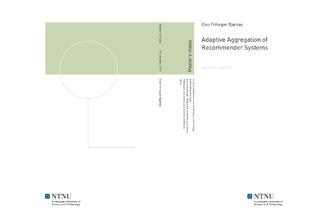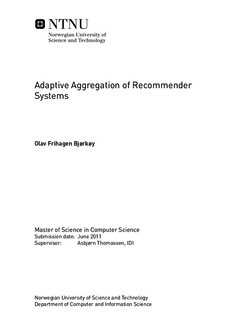| dc.description.abstract | In the field of artificial intelligence, recommender systems are methods for predicting the relevance items to a users. The items can be just about anything, for example documents, articles, movies, music, events or other users. Recommender systems examine data such as ratings, query logs, user behavior and social connections to predict what each user will think of each item.Modern recommender systems combine multiple standard recommenders in order to leverage disjoint patterns in available data. By combining different methods, complex predictions that rely on much evidence can be made. These aggregations can for example be done by estimating weights that result in an optimal combination.However, we posit these systems have an important weakness. There exists an underlying, misplaced subjectivity to relevance prediction. Each chosen recommender system reflects one view of how users and items should be modeled. We believe the selection of recommender methods should be automatically chosen based on their predicted accuracy for each user and item. After all, a system that insists on being adaptive in one particular way is not really adaptive at all.This thesis presents a novel method for prediction aggregation that we call adaptive recommenders. Multiple recommender systems are combined on a per-user and per-item basis by estimating their individual accuracy in the current context. This is done by creating a secondary set of error estimating recommenders. The core insight is that standard recommenders can be used to estimate the accuracy of other recommenders. As far as we know, this type of adaptive prediction aggregation has not been done before.Prediction aggregation (combining scores) is tested in a recommendation scenario. Rank aggregation (sorting results lists) is tested in a personalized search scenario. Our initial results are promising and show that adaptive recommenders can outperform both standard recommenders and simple aggregation methods. We will also discuss the implications and limitations of our results. | nb_NO |

